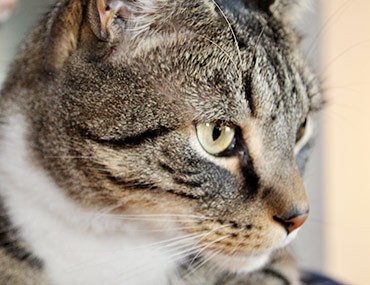Overview
Colitis is an inflammation or irritation of the colon or large intestine and, you guessed it: it commonly causes diarrhea in our furry friends.
Signs
Colitis can be acute (meaning it comes on suddenly) or chronic (lasting several days to weeks, or recurring). There are several potential causes of colitis.
They include:
- Stress
- Intestinal parasites such as roundworms, Coccidia, or Giardia
- Viral infections, particularly feline leukemia virus (FeLV), feline immunodeficiency virus (FIV), or feline infectious peritonitis (FIP)
- A secondary reaction to antibiotics and other medications
- Pancreatitis
- Dietary intolerance or allergy
- Dietary indiscretion (e.g., ingesting table food)
- Bacterial infection
- Foreign body
- Inflammatory or irritable bowel disease (IBD)
- Bowel cancer (in older cats or cats infected with FeLV or FIV)
- Idiopathies (underlying cause is unknown)
 Cats with colitis often have fresh, red blood and/or mucus in their stools. They may strain to defecate, go more often than normal, or miss the litter pan. In some cases, your cat may seem constipated and strain with no results. With acute colitis, your cat might show no other signs of being sick except, possibly, diarrhea or straining to defecate. With chronic colitis, you could notice poor appetite, weight loss, and general lethargy.
Cats with colitis often have fresh, red blood and/or mucus in their stools. They may strain to defecate, go more often than normal, or miss the litter pan. In some cases, your cat may seem constipated and strain with no results. With acute colitis, your cat might show no other signs of being sick except, possibly, diarrhea or straining to defecate. With chronic colitis, you could notice poor appetite, weight loss, and general lethargy.
Diagnosis/Treatment
Because there are so many potential causes of colitis, be sure to provide your veterinarian with a complete history of your pet, including:
- Symptoms
- Recent exposure to other cats
- If your cat roams/has free, unsupervised access to your yard
- If your cat has eaten something he shouldn’t have eaten
- If your cat has recently gotten into the garbage or was given people food
- If you have recently changed your cat’s food
If your veterinarian suspects colitis, they will want to identify the underlying cause.
In order to do this, they may recommend a combination of the following tests:
- Chemistry tests to evaluate kidney, liver, and pancreatic disease and dysfunction, as well as sugar levels
- A complete blood count (CBC) to look for infection, inflammation, anemia, and other blood-related conditions
- Electrolyte tests to ensure your cat isn’t dehydrated or suffering from an electrolyte imbalance
- X-rays of the abdomen to evaluate the gastrointestinal tract and other major organs, and to check for abnormalities such as tumors and fluid
- Ultrasound to image your cat’s digestive tract and other abdominal organs
- Endoscopy to evaluate the lining of the stomach and intestinal tract
- Tests to rule out viral infections, such as FeLV and FIV
- Pancreas-specific tests to rule out or confirm pancreatitis
- Fecal tests
- Special fecal tests, such as cultures and PCR testing
Depending on the severity of the colitis, your cat may be hospitalized to better control his diarrhea. In less severe cases, your veterinarian may give you medications and instructions on how to care for your four-legged friend at home. It is very important that you follow the treatment instructions from your veterinarian carefully, to reduce the chance of the diarrhea returning.
Prevention
Some of the best ways to keep your pet healthy are to watch what he eats, keep him free of parasites by giving him monthly preventives, and submitting his fecal samples to your veterinarian—especially if he goes outdoors. Also, make sure your cat is current on all recommended vaccines. Keeping him away from trash and other unfamiliar (if yummy) items, such as people food, and restricting his contact with other cats will also protect her from becoming sick.
If you have any questions or concerns, you should always visit or call your veterinarian – they are your best resource to ensure the health and well-being of your pets.
